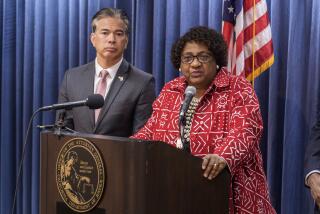Assembly GOP Chief Challenged to Lie-Detector Test
- Share via
SACRAMENTO — A Democratic Assemblyman who was attacked in a phony presidential endorsement letter as a friend of the “underworld drug industry” challenged Assembly Republican Leader Pat Nolan of Glendale Monday to take a lie-detector test.
Assemblyman Richard E. Floyd of Hawthorne said he believes elected officials, not their staff members, are responsible for the letter, and he added that he is not satisfied with the explanation that “the whole thing is just some sort of crazy mix-up.” Floyd said he believed Nolan and Assemblymen Dennis Brown (R-Long Beach) and John R. Lewis (R-Orange) probably were responsible for the phony letters.
The endorsement letters, made to appear to have been written on White House stationery, included reproductions of President Reagan’s signature but were never approved by the White House before being mailed. They were mailed to voters on behalf of six GOP Assembly candidates, including newly elected Assemblyman Richard E. Longshore (R-Santa Ana), just before the Nov. 4 election.
Nolan was unavailable for comment Monday, and his press secretary said he probably had not seen Floyd’s letter because his office in Sacramento is in the process of moving.
Floyd, still angry over the letter attacking him, sent the Republican leader a letter Monday suggesting the polygraph. He added in an interview that he will ask state and federal authorities to prosecute persons responsible for the letters unless Nolan agrees and passes the polygraph. Floyd said the lie-detector test would include “a mutually agreed upon set of questions.”
Last week, Nolan’s press secretary, Mike Pottage, said the letters had been sent out through a “careless . . . communications breakdown” between Assembly GOP Caucus staff members on leave to work in Assembly campaigns. Pottage, who declined to name the staff members responsible, said they had given the go-ahead for campaigns to use the Reagan letters, believing the Republican National Committee had secured the necessary clearances from the White House.
But Floyd said on Monday that the explanation “sounds like bull . . . “ and added, “If some staff guy pulled something like this off . . . they would hang that guy from the nearest tree.”
Assemblyman Brown managed the hard-hitting campaign of Roger Fiola, Floyd’s opponent. Lewis, elections chairman for the Assembly Republican Caucus, oversaw three of the other five campaigns in which unauthorized presidential endorsement letters were used. Both legislators were vacationing and unavailable for comment.
In his letter to Nolan, Floyd said: “Originally, you claimed that the letters were modifications of approved presidential endorsements. Now, you say that there never was an approved Reagan endorsement and the whole thing is just some sort of crazy mix-up. While you are apparently satisfied that this explanation ends the affair, I am not.”
Floyd said that “unanswered questions” include:
- Who wrote the letters and who told them to do so.
- How long in advance the letters were prepared and whether their “last-minute publication” was “intended to prevent verification of President Reagan’s involvement.”
- When Nolan first learned about the letters and the role played by elected officials overseeing the campaigns.
- Who decided on the charges that Floyd had caved in “to the powerful underworld drug industry.”
More to Read
Get the L.A. Times Politics newsletter
Deeply reported insights into legislation, politics and policy from Sacramento, Washington and beyond. In your inbox three times per week.
You may occasionally receive promotional content from the Los Angeles Times.










